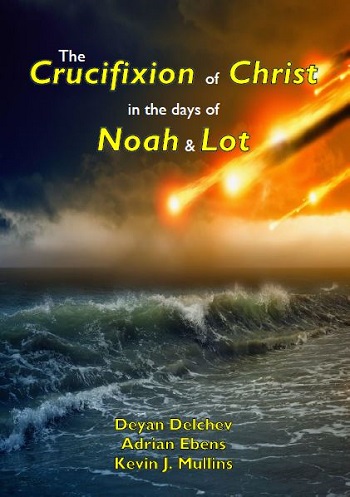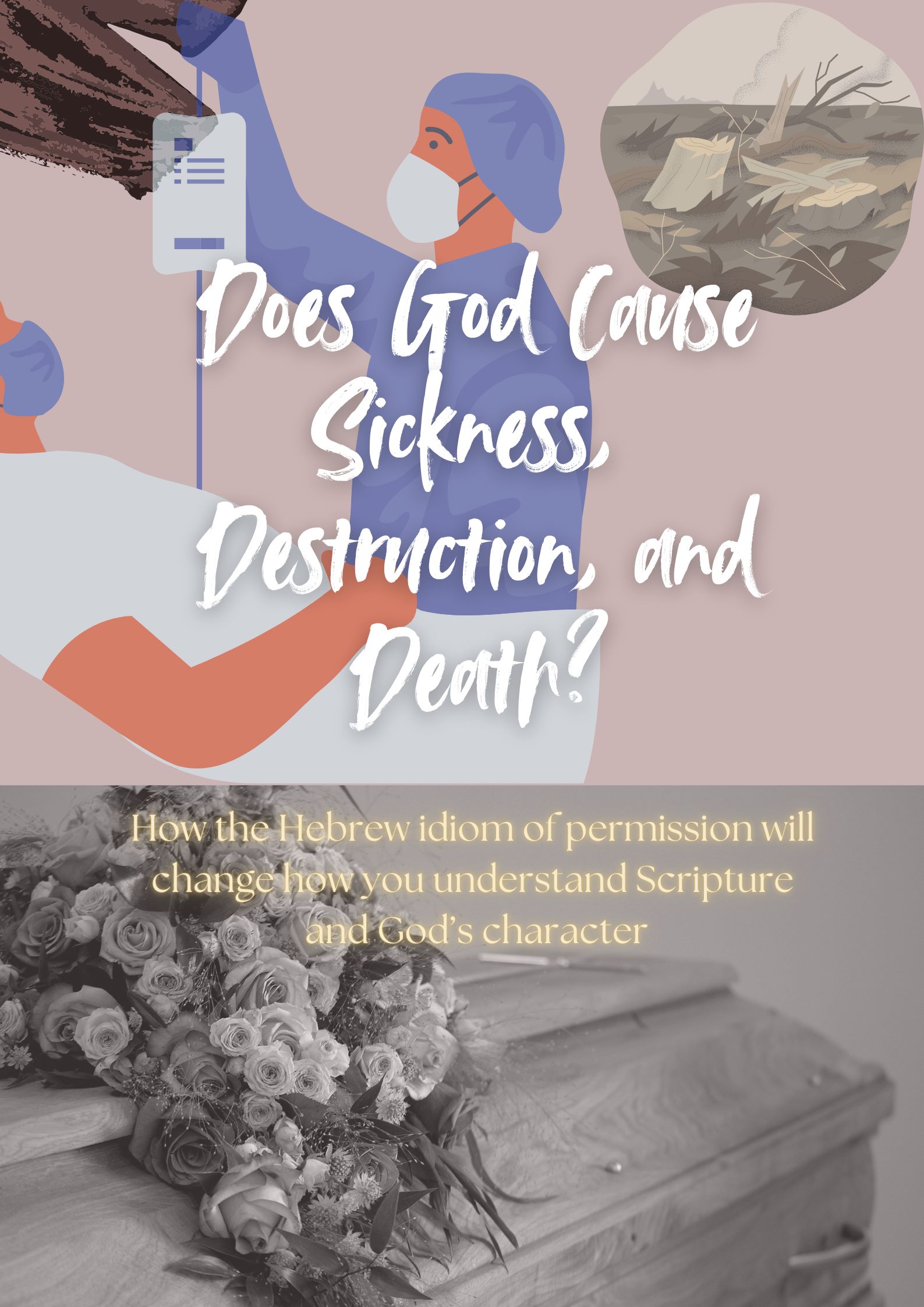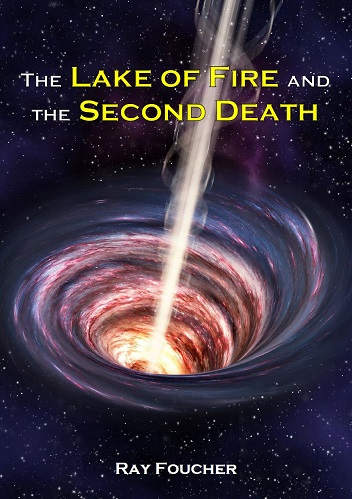(Mark 9:43-44) What Does the Bible Mean When it Says People Will “Go into Hell … Where Their Worm Dieth Not, and the Fire is not Quenched"?
"And if thy hand offend thee, cut it off: it is better for thee to enter into life maimed, than having two hands to go into hell, into the fire that never shall be quenched: Where their worm dieth not, and the fire is not quenched." (Mark 9:43, 44)
First, What is This Worm?
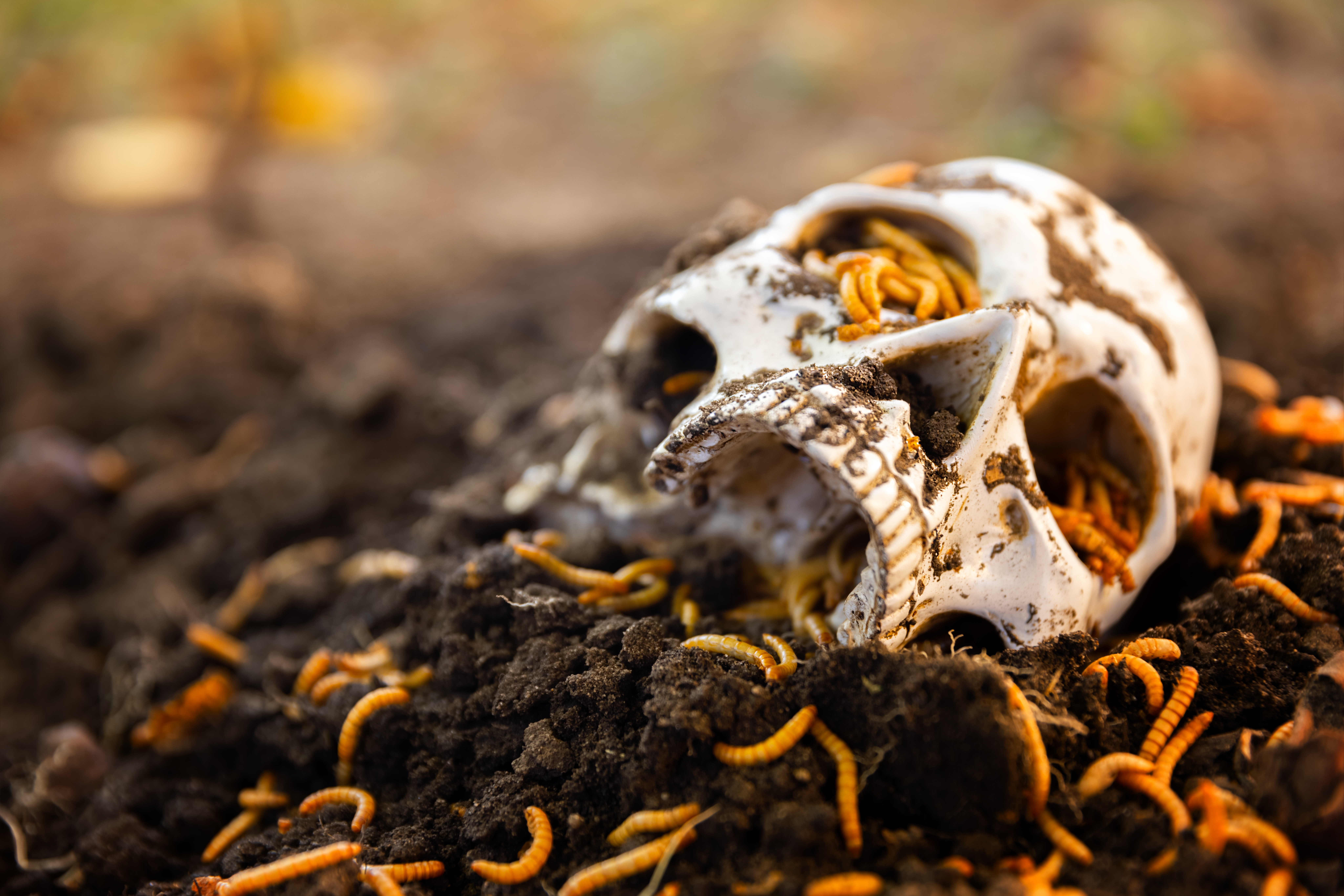 The "worm" referred to here is a literal worm that feeds off the corpses of dead bodies:
The "worm" referred to here is a literal worm that feeds off the corpses of dead bodies:
“For the moth shall eat them up like a garment, and the worm shall eat them like wool: but My righteousness shall be for ever, and My salvation from generation to generation.” (Isaiah 51:8)
When Jesus referred to this worm above in Mark chapter 9 He was quoting from Isaiah chapter 66 which speaks of the worm feeding off carcases:
"And they shall go forth, and look upon the carcases of the men that have transgressed against Me: for their worm shall not die, neither shall their fire be quenched; and they shall be an abhorring unto all flesh." (Isaiah 66:24)
To Lucifer (Satan) God said:
"Thy pomp is brought down to the grave, and the noise of thy viols: the worm is spread under thee, and the worms cover thee." (Isaiah 14:11)1
In all of these cases Scripture is talking about a worm feeding off dead bodies.
The Meaning of “Hell”
The Hebrew word for “grave” in Isaiah 14:11 above is שְׁאוֹל (sheol) which, in the King James Version (KJV) of the Bible, it is translated as “grave” 31 times, “hell” 31 times, and “pit” 6 times.
Psalm 9:17 says, “The wicked will be turned into hell ...” (KJV). However, the Hebrew verb used for “be turned” is translated as “turned back” in verse 3. Thus verse 17 literally says the wicked “shall return” to hell. How is it that they will “return” to hell? We can see a clear comparison when we read another verse which tells us what happens at death:
“His breath departs, he returns to his dust (self’s origin). In that very day his thoughts perish.” (Psalm. 146:4)
At death, our bodies decompose back into the earth (dust) and our thoughts (our intellect/being/plans) perish. Man returns to hell/sheol (the grave) where he unconsciously awaits his resurrection.
In Scripture, “death” is spoken of as a “sleep” (Job 7:21; 14:12; Daniel 12:2; Luke 8:52; John 11:11-14; 1 Corinthians 15:51; 1 Thessalonians 4:15). Think of death as what happens to a computer when it goes into sleep mode. All the information is still there and protected by the computer’s hard drive. When the computer is awakened all the information is still there ready to be used and most-likely in need of an update. The same goes for when we fall asleep in death. All of our information is protected by God (Ecclesiastes 12:7) and remains there unconsciously until He awakes us from our sleep. It’s your choice whether or not you receive an update.
"Listen, I will tell you a mystery: We will not all sleep (die, because some of us will be alive at the second coming), but we will all be changed – in a moment, in the blinking of an eye, at the last trumpet. For the trumpet will sound, and the dead will be raised imperishable, and we will be changed. For this perishable body must put on the imperishable, and this mortal body must put on immortality. Now when this perishable puts on the imperishable, and this mortal puts on immortality, then the saying that is written will happen, 'Death has been swallowed up in victory.' 'Where, O death, is your victory? Where, O death, is your sting?'” (1 Corinthians 15:51-55, New English Translation)
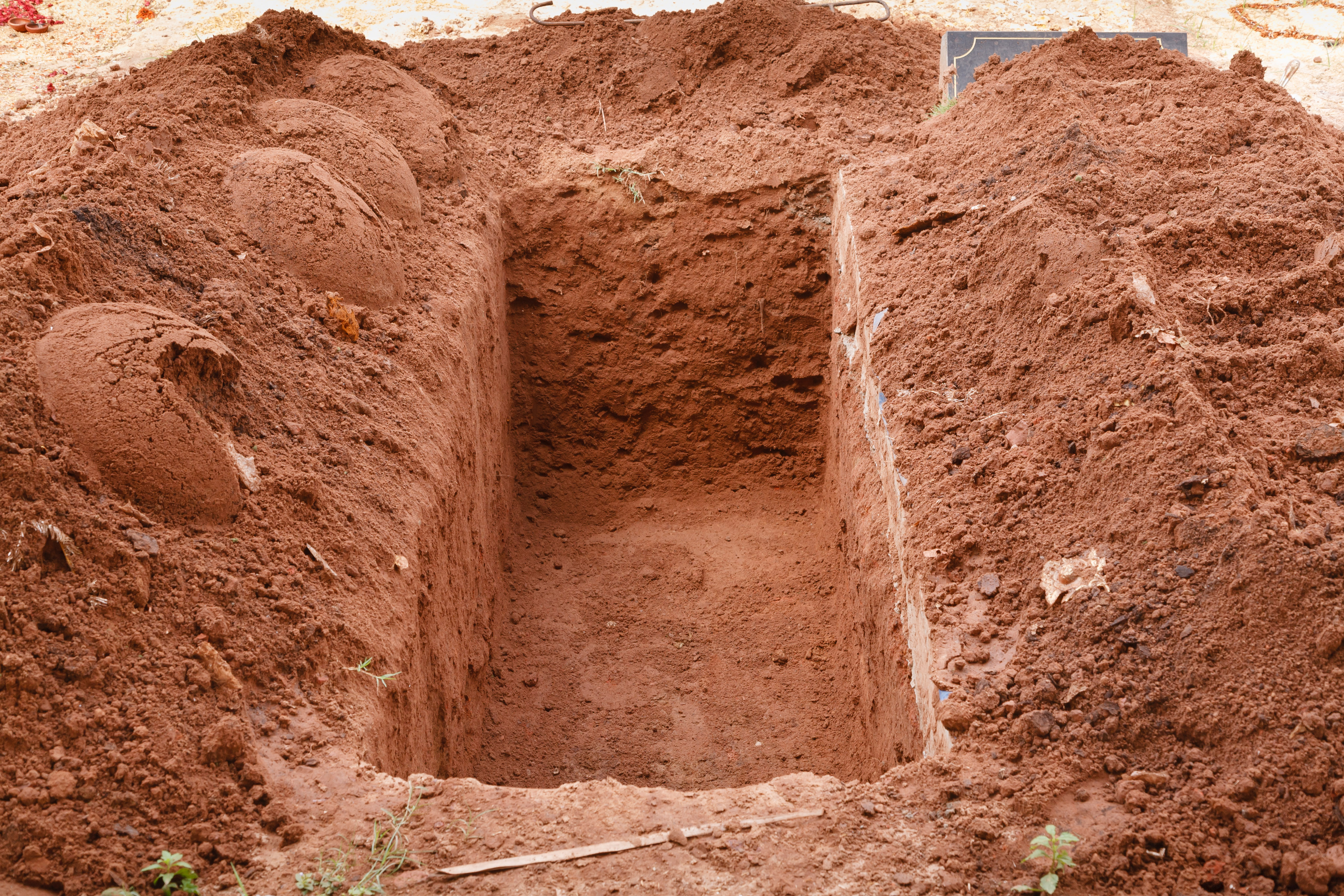 Listen to what Job says as recorded in the King James Version:
Listen to what Job says as recorded in the King James Version:
“O that Thou wouldest hide me in the grave, that Thou wouldest keep me secret, until Thy wrath be past, that Thou wouldest appoint me a set time, and remember me!” (Job 14:13)
The Hebrew word translated as “grave” here is again sheol which, as we have seen, can be translated as “hell.” In fact, the Douay Version translates it like this:
“Who will grant me this, that Thou mayest protect me in hell, and hide me till Thy wrath pass?”
He’s placing his trust in God who will preserve his life while buried and not let him see total, or eternal, corruption. His hope is in the resurrection when he would be delivered from hell “at the last day” (John 6:39-40, 44, 54). John also wrote:
“And the sea gave up the dead which were in it; and death and hell (the grave) delivered up the dead which were in them: and they were judged every man according to their works. And death and hell were cast into the lake of fire. This is the second death. And whosoever was not found written in the Book of Life was cast into the lake of fire.” (Revelation 20:13, 14).
If wicked people go to a place of eternal burning called “hell” at death, how is it that the dead will rise from hell only to be thrown back into the fire after they are judged? And if hell is a place of eternal burning, how can hell be cast into the lake of fire? Clearly, the lake of fire is used metaphorically for eternal separation from God – the ONLY source of life – without any further hope of a future resurrection. For more information on what the lake of fire is, see the article entitled: Doesn’t the Bible Say That God Will Burn and Torture people “Forever and Ever”?
Those Who Reject Their Salvation Will Be Returned to “Ashes”
The Greek word for “hell” Jesus uses in Mark 9:43 above is the word γέενναν (Gehenna or Valley of Hinnom.) It has been taught throughout many churches that the Valley of Hinnom was a place known as a refuse pit where all types of trash, animal carcasses, and corpses of wicked criminals, whom the Jews felt didn’t deserve to be buried, were burned. It is taught that Jesus likened this dump to what takes place with the wicked at the end of time. (I used to believe this as well, and am updating this article accordingly). There is really no archaeological evidence that the Valley of Hinnom was ever the town dump. The first reference ever made of Gehenna (the Valley of Hinnom) as being a dump was written in 1200 A.D. by a rabbi named David Kimhi, but ancient Jewish literature knows nothing of such an idea. So what did Jesus have in mind when He mentioned it in Mark 9:43?
“ ‘Therefore behold, the days are coming,’ says the Lord, ‘when it will no more be called Tophet, or the Valley of the Son of Hinnom, but the Valley of Slaughter; for they will bury in Tophet until there is no room. The corpses of this people will be food for the birds of the heaven and for the beasts of the earth. And no one will frighten them away.’” (Jeremiah 7:32, 33)
It says basically the same thing in Jeremiah chapter 19:
“ ‘Therefore behold, the days are coming,’ says the Lord, ‘that this place shall no more be called Tophet or the Valley of the Son of Hinnom, but the Valley of Slaughter. And I will make void the counsel of Judah and Jerusalem in this place, and I will cause them to fall by the sword before their enemies and by the hands of those who seek their lives; their corpses I will give as meat for the birds of the heaven and for the beasts of the earth.’” (Jeremiah 19:6, 7)
Clearly, Jesus was referring to a time and place of utter slaughter where the corpses will remain unburied and be eaten by beasts and birds of prey. In the biblical mind, this is the worst fate possible. This is what happened to Jezebel — she died, was left unburied and was eaten by dogs (2 Kings 9:10, 30-37). Jesus also mentions this in the book of Luke where He is discussing events surrounding His second coming:
“Two women shall be grinding together; the one shall be taken, and the other left. Two men shall be in the field; the one shall be taken, and the other left. And they answered and said unto Him, Where, Lord? And He said unto them, Wheresoever the body is, thither will the eagles be gathered together.” (Luke 17:35, 36)
Jesus says the corpses of the ones who are taken will be food for the “eagles” (or, “vultures” as other translations say). This is explained again in the 19th chapter of the book of Revelation where it describes Christ’s second coming:
“And I saw heaven opened, and behold a white horse; and He that sat upon him was called Faithful and True, and in righteousness He doth judge and make war … And the armies which were in heaven followed Him upon white horses, clothed in fine linen, white and clean … And I saw an angel standing in the sun; and he cried with a loud voice, saying to all the FOWLS THAT FLY in the midst of heaven, Come and GATHER YOURSELVES TOGETHER unto the supper of the great God; That ye may EAT the flesh of kings, and the flesh of captains, and the flesh of mighty men, and the flesh of horses, and of them that sit on them, and the flesh of all men, both free and bond, both small and great. And I saw the beast, and the kings of the earth, and their armies, gathered together to make war against Him that sat on the horse, and against His army. And the beast was TAKEN, and with him the false prophet that wrought miracles before him, with which he deceived them that had received the mark of the beast, and them that worshipped his image. These both were cast alive into a lake of fire burning with brimstone. And the remnant were slain with the sword of Him that sat upon the horse, which sword proceeded out of His mouth: and all the fowls were filled with their flesh.” (Revelation 19:11, 14, 17-21)
When Jesus adds the phrase, “Where their worm dieth not, and the fire is not quenched”, He’s combining the prophecy of Jeremiah with the prophecy of Isaiah 66 we mentioned earlier. Keep in mind we are dealing with corpses — "And they shall go forth and look upon the corpses of the men who have transgressed against Me. For their worm does not die, and their fire is not quenched. They shall be an abhorrence to all flesh” (Isaiah 66:24, New King James Version). The worms are feeding off dead bodies, not souls that are screaming and yelling for eternity in fire. What the beasts and birds don’t get, the worms will eat, and what the worms don’t eat, the fire will consume. The corpses of man and beast (including the worm) will burn to ashes. Notice what Malachi says concerning the fate of those who reject their salvation:
“And ye shall tread down the wicked; for they shall be ashes under the soles of your feet in the day that I shall do this, saith the LORD of hosts.” (Malachi 4:3)
Satan’s fate is the same:
“Thine heart was lifted up because of thy beauty, thou hast corrupted thy wisdom by reason of thy brightness: I will cast thee to the ground, I will lay thee before kings, that they may behold thee. Thou hast defiled thy sanctuaries by the multitude of thine iniquities, by the iniquity of thy traffick; therefore will I bring forth a fire from the midst of thee, it shall devour thee, and I will bring thee to ashes upon the earth in the sight of all them that behold thee.” (Ezekiel 28:17, 18)
Notice here the fire comes from within Satan, not from God. The fire which kills the wicked is not a fire of combustion. However, the combustible fire which turns the wicked into ashes, and also Peter's description of the elements melting with fervent heat (2 Peter 3:12), comes AFTER they are dead and NOT while they are alive. God tortures no one! The physical fire is not meant for torture, but only to cleanse (purify) the earth. Again, see the aforementioned article entitled: Doesn’t the Bible Say That God Will Burn and Torture people “Forever and Ever”?
What About the Phrase, “The Fire is Not Quenched”?
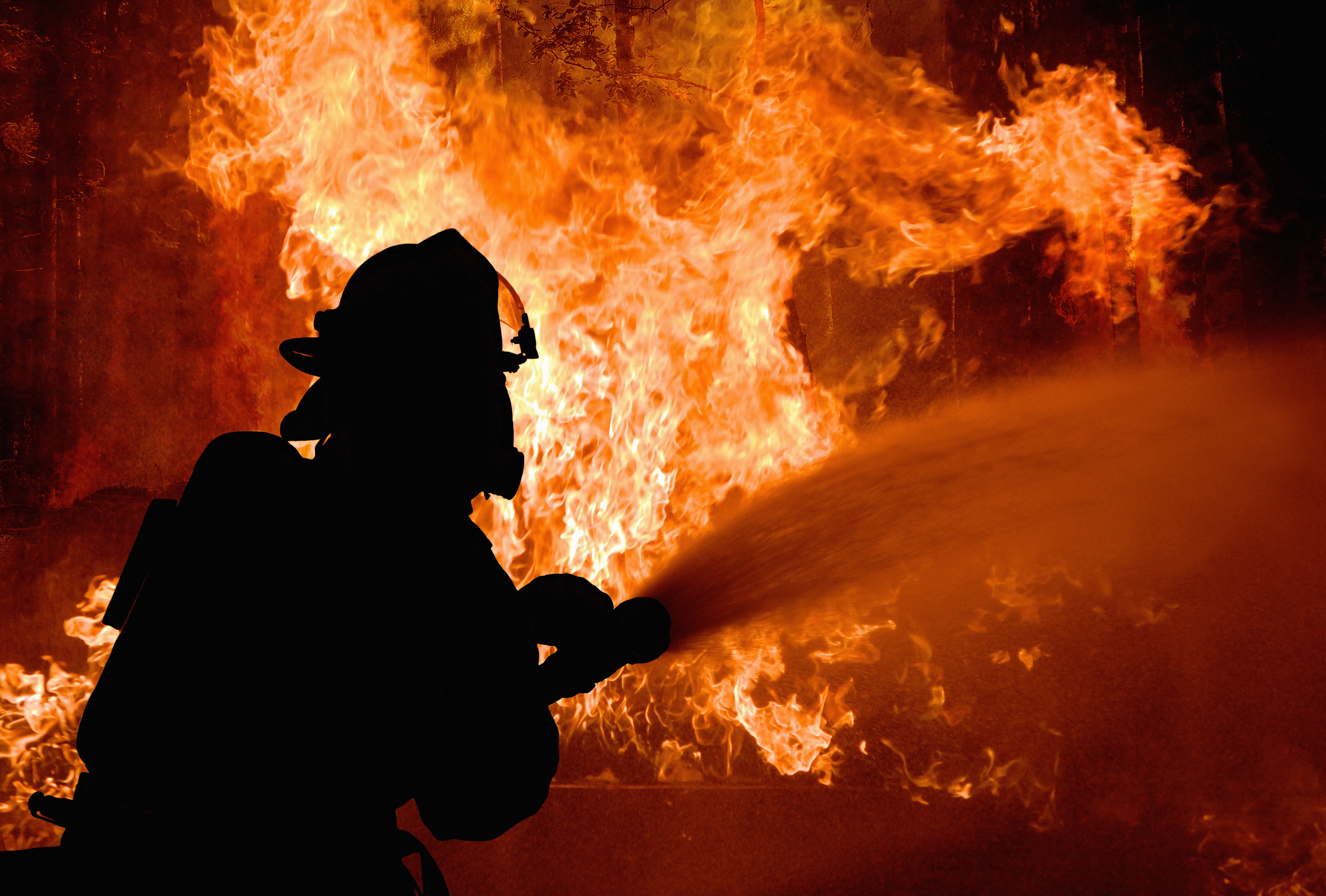 The word “quench” means “to extinguish” or “put out.” No one will be able to put the fire out. Jeremiah’s prophecy of “no one will frighten them away” is parallel to the worm not dying and the fire not being quenched. No one will shoo away the birds, beasts, or worms and no one will put the fire out. This doesn’t mean the worm and beasts have immortality. The emphasis is on the fact that they will not leave their destructive task incomplete. Jeremiah also prophesied that Jerusalem would be destroyed by fire that would not be quenched:
The word “quench” means “to extinguish” or “put out.” No one will be able to put the fire out. Jeremiah’s prophecy of “no one will frighten them away” is parallel to the worm not dying and the fire not being quenched. No one will shoo away the birds, beasts, or worms and no one will put the fire out. This doesn’t mean the worm and beasts have immortality. The emphasis is on the fact that they will not leave their destructive task incomplete. Jeremiah also prophesied that Jerusalem would be destroyed by fire that would not be quenched:
“But if ye will not hearken unto Me to hallow the Sabbath day, and not to bear a burden, even entering in at the gates of Jerusalem on the Sabbath day; then will I kindle a fire in the gates thereof, and it shall devour the palaces of Jerusalem, and it shall not be quenched.” (Jeremiah 17:27)
First of all, notice that this unquenchable fire “will devour (or, consume) the palaces of Jerusalem.” In fact, because of this fire, Jerusalem was left “desolate”, but only for 70 years (2 Chronicles 36:19-21). Jerusalem was burned with unquenchable fire, but Jerusalem is not burning today. The fire is referred to as being that which cannot be quenched because no one was able to put the fire out. But it did burn out on its own. The fire did not burn out until it had completed its job of making Jerusalem desolate. When we read what Isaiah has to say about the lake of fire, the whole picture becomes crystal clear:
“Behold, they shall be as stubble; the fire shall burn them; they shall not deliver themselves from the power of the flame: there shall not be a coal to warm at, nor fire to sit before it.” (Isaiah 47:14)
Isaiah also prophesied:
“Through the wrath of the LORD of hosts is the land darkened, and the people shall be as the fuel of the fire: no man shall spare his brother.” (Isaiah 9:19)
The prophet Isaiah speaks of God's wrath here. In the article entitled What is God's Wrath? we learn that God's wrath isn't about God going into a viscious rage and violently killing anyone who disobeyes Him. God's wrath is simply the removal of His protective presence, giving the unbelieving sinner over to their own destructive ways. In fact, this is exactly how Scripture describes the fate of those who reject salvation – they will all destroy each other and themselves:
 "Therefore thus saith the Lord GOD; Because thou (Satan) hast set thine heart as the heart of God; Behold, therefore I will bring strangers upon thee, the terrible of the nations: and they shall draw their swords against the beauty of thy wisdom, and they shall defile thy brightness. They shall bring thee down to the pit, and thou shalt die the deaths of them that are slain in the midst of the seas. Wilt thou yet say before him that slayeth thee, I am God? but thou shalt be a man, and no God, in the hand of him that slayeth thee. Thou shalt die the deaths of the uncircumcised by the hand of strangers: for I have spoken it, saith the Lord GOD." (Ezekiel 28:6-10)
"Therefore thus saith the Lord GOD; Because thou (Satan) hast set thine heart as the heart of God; Behold, therefore I will bring strangers upon thee, the terrible of the nations: and they shall draw their swords against the beauty of thy wisdom, and they shall defile thy brightness. They shall bring thee down to the pit, and thou shalt die the deaths of them that are slain in the midst of the seas. Wilt thou yet say before him that slayeth thee, I am God? but thou shalt be a man, and no God, in the hand of him that slayeth thee. Thou shalt die the deaths of the uncircumcised by the hand of strangers: for I have spoken it, saith the Lord GOD." (Ezekiel 28:6-10)
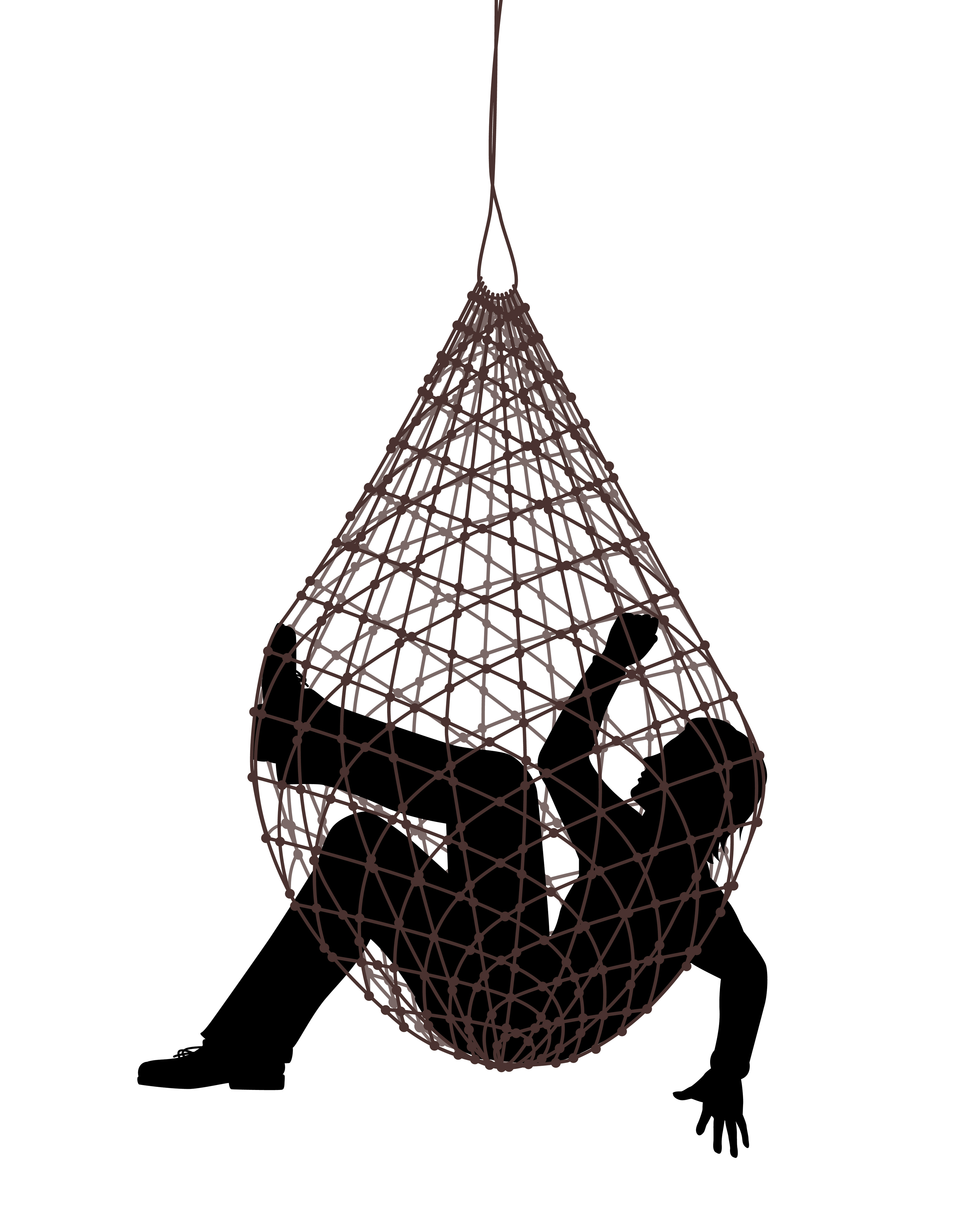 "And I will overthrow the throne of kingdoms, and I will destroy the strength of the kingdoms of the heathen; and I will overthrow the chariots, and those that ride in them; and the horses and their riders shall come down [how will God do this?] every one by the sword of his brother." (Haggai 2:22)
"And I will overthrow the throne of kingdoms, and I will destroy the strength of the kingdoms of the heathen; and I will overthrow the chariots, and those that ride in them; and the horses and their riders shall come down [how will God do this?] every one by the sword of his brother." (Haggai 2:22)
“See the one who is pregnant with wickedness, who conceives destructive plans, and gives birth to harmful lies—he digs a pit and then falls into the hole he has made. He becomes the victim of his own destructive plans and the violence he intended for others falls on his own head.” (Psalm 7:14-16, NET)
"The heathen are sunk down in the pit that they made: in the net which they hid is their own foot taken." (Psalm 9:15)
1 It is widely accepted that, although Isaiah 14 and Ezekiel 28 are referring to the earthly kings of Babylon and Trye, they are prophetically speaking of Satan and his rebellion against God.

.jpg)
